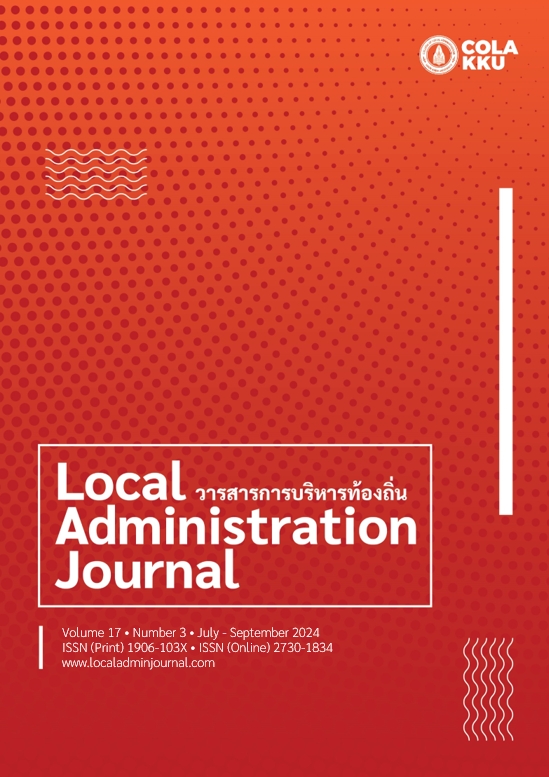ศักยภาพในการสร้างเครือข่ายให้ความช่วยเหลือในด้านการมีอาหารของครัวเรือนคนจนเมืองในเขตเทศบาลนครขอนแก่น จังหวัดขอนแก่น
คำสำคัญ:
ครัวเรือนคนจนเมือง, ความมั่นคงทางอาหาร, การมีอาหาร, เครือข่ายความช่วยเหลือ, สุขภาวะที่ดีและความอยู่ดีมีสุขบทคัดย่อ
การศึกษาครั้งนี้มีวัตถุประสงค์เพื่อศึกษาสถานการณ์การมีอาหารและศักยภาพของครัวเรือนคนจนเมืองในการสร้างเครือข่ายการให้ความช่วยเหลือการมีอาหารในเขตเทศบาลนครขอนแก่น จังหวัดขอนแก่น ใช้วิธีการวิจัยเชิงคุณภาพ พื้นที่ศึกษาคัดเลือกแบบเจาะจงจากปรากฏการณ์ที่แสดงถึงศักยภาพของชุมชนในประเด็นความมั่นคงทางอาหารของชุมชนริมทางรถไฟที่มีความแตกต่างกัน จำนวน 3 ชุมชน ในเขตเทศบาลนครขอนแก่น ผู้ให้ข้อมูลสำคัญจำนวนทั้งหมด 30 คน โดยแบ่งออกเป็น 4 กลุ่ม วิเคราะห์ผลด้วยการวิเคราะห์เนื้อหาและหาความสอดคล้องระหว่างความถูกต้องของข้อมูลด้วยวิธีการแบบสามเส้า ผลการศึกษา พบว่า สถานการณ์การมีอาหารของครัวเรือนคนจนเมือง ไม่มีความรู้เรื่องโภชนาการในการบริโภคอาหารให้เพียงพอต่อความต้องการของร่างกาย และรายได้ไม่เพียงพอต่อการดำรงชีวิตประจำวัน ส่งผลให้ต้องปรับลดปริมาณและคุณภาพอาหารลงเพื่อให้มีเงินซื้ออาหารมื้อต่อไปได้ เกิดเป็นปัญหาสุขภาพไม่แข็งแรง เจ็บป่วยบ่อย ครัวเรือนจึงต้องพึ่งพาอาหารจากแหล่งอาหารธรรมชาติ อาหารผลิตเอง และอาหารจากการให้ความช่วยเหลือ เพื่อลดค่าใช้จ่ายในด้านอาหาร ขณะเดียวกันครัวเรือนคนจนเมือง ได้รับการสนับสนุนให้มีศักยภาพทักษะ และความรู้ จากผู้นำชุมชนที่มีศักยภาพการประสานงานเครือข่าย และประสบการณ์ จนเกิดการสร้างเครือข่ายให้ความช่วยเหลือในด้านการมีอาหารขึ้นมา ซึ่งเครือข่ายดังกล่าวมีทั้งเครือข่ายภายในชุมชน ที่เกิดจากความสัมพันธ์คล้ายเครือญาติ มีลักษณะไม่เป็นทางการ และมีเครือข่ายภายนอกชุมชนเกิดจากองค์กรและหน่วยงานที่เข้ามาส่งเสริมและสนับสนุนมีลักษณะเป็นแบบบังคับบัญชา ดังนั้น ควรมีนโยบายสนับสนุนการมีให้ความรู้เรื่องโภชนาการการบริโภคอาหารแก่ครัวเรือนคนจนเมืองและมีตลาดอาหารปลอดภัยและราคาถูกสำหรับคนจนเมืองที่เกิดจากเครือข่ายความร่วมมือทุกภาคส่วนเพื่อให้ครัวเรือนคนจนเมืองเข้าถึงอาหารที่มีคุณภาพและปลอดภัย
เอกสารอ้างอิง
Apakaro,P. (2004). Networks, nature, knowledge and management. Bangkok: Project (in Thai) to strengthen the learning process for a happy community. (in Thai)
Bourdieu, P. (1993). Sociology in Question. London: SAGE
Chotdee, T. (2009). Food security of low income household in Bangkok Metropolis. (master’s thesis).
Thammasat University. Bangkok, Thailand.
Chaisrisawatsuk, S. (n. d.). Food security and sustainability., Retrieved September 4, 2023 from https://econ.nida.ac.th/2022/12/%E0%B8%84%E0%B8%A7%E0%B8%B2%E0%B8%A1 (in Thai)
FAO. (2006). Food security. Policy Brief, 2, 1–4. Retrieved from http://www.fao.org/forestry/13128-0e6f36f27e0091055bec28ebe830f46b3.pdf
Jenjad, R. (2023). Food security” and communication that still lacks stability. Journal of Media and Communication Inquiry, 5(2), 5-6. (in Thai)
Kuan-at, W., & Thin Phangnga, P. (n. d.). Urbanization in Thailand. November15, 2023, Retrieved from https://www.tei.or.th/thaicityclimate/public/research-46.pdf (in Thai)
Makmee, P. (2021). Social network analysis for designing social science research. Journal of Educational Measurement Mahasarakham University, 27(1), 32-33. (in Thai)
Office of Agricultural Economics. (2022). The Economist Global Food Security Index 2022(GFSI). Retrieved November 21, 2023, from https://oaezone.oae.go.th/assets/portals/3/fileups/biae/files/Infographic/Global%20Food%20Security%20Index_.pdf (in Thai)
Promphakping, B., Inmuang, Y., & Phongsiri, M. (2019). Khon Kaen City: Growth, Challenges, and Opportunities. Nonthaburi: Tawan media publishing house. (in Thai)
Prachasan, S. (2012). Food security: concepts and indicators. Nonthaburi: Bio Thai Foundation. (in Thai)
Pinthongphan, A. (2014). Beautiful and Edible Garden to Promote Food Security: A Case Study of Soi Bonkai-Thayang Community, Kho Hong Sub-District, Hatyai Distirct, Songkhla Province. the degree of Master of Arts, Retrieved from https://scholar.google.com/ (in Thai)
Phongphit, S. (2005). Network strategies for a strong community strong community. Bangkok: University of Life Project Institute of Learning for the People. (in Thai)
Suwittawat, J., Suriya,P., Kuna Rattana Phruek.K. (2009). Dietary Intake of Elderly in the Slum Areas of Khon Kaen Metropolitan District. Journal of Public Health, Burapha University, 4(2), 11-19. (in Thai)
Sutheewasinnon, P., Pasunon, P. (2016). Sampling Strategies for Qualitative Research. Parichart Journal, 29(2), 31-48. (in Thai)
Tolossa, D. (2010). Some realities of the urban poor and their food security situations: a case study of Berta Gibi and Gemechu Safar in the city of Addis Ababa, Ethiopia. Environment and Urbanization, 22(1), 179-198.
Visetpricha, B. (2021). The opposition movement to demand the right to participate in the city by the 4-region slum network. Journal of Social Sciences Naresuan University, 17(2), 177-217. (in Thai)
Wright, L., & Gupta, P. (2015). Coping strategies adopted by urban poor to ameliorate food insecurity: case of United States, Belize and India. Journal of Food Security, 3(2), 40-46
ดาวน์โหลด
เผยแพร่แล้ว
รูปแบบการอ้างอิง
ฉบับ
ประเภทบทความ
สัญญาอนุญาต
ลิขสิทธิ์ (c) 2024 วารสารการบริหารท้องถิ่น

อนุญาตภายใต้เงื่อนไข Creative Commons Attribution-NonCommercial-NoDerivatives 4.0 International License.
บทความทุกเรื่องที่ได้รับการตีพิมพ์ทั้งรูปเล่มและบทความออนไลน์ เป็นลิขสิทธิ์ของวิทยาลัยการปกครองท้องถิ่น มหาวิทยาลัยขอนแก่น



